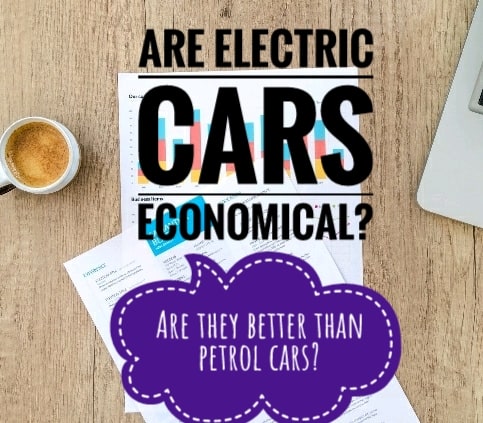
Economic viability is a major factor that has been considered by everyone who invests in anything. The same is applicable for electric vehicles as well.
Why does a customer go for an electric vehicle? Are they worth buying?
A few years ago I owned one electric scooter. You may check out how was the experience here – My electric scooter experience.
What benefits does the customer get from an EV? Are electric cars economical?
A large number of questions arise when one plans to get an electric vehicle.
Expenses of electric vehicle
Answers for the economic feasibility of electric vehicles would be as follows. Electric vehicles are becoming a close competitor with conventional Internal Combustion Engine vehicles in terms of performance, cost, etc.
Most of the vehicle manufacturers either started manufacturing electric vehicles or declared their plans.
Even though there are only a few electric vehicles (Tesla Electric Vehicles) have a range comparable to that of IC engine vehicles, EVs gain momentum.

High voltage batteries are one of the costlier components in an electric vehicle. There is a lot of electric vehicle battery researches going on.
Electric motors are better than IC engines due to their speed-torque characteristics, and efficiency.
An electric motor can provide high torque even at low speeds. It would help out the EV to eliminate a multi-gear transmission system.
Do you know that an electric truck does not have an 18-speed transmission?
Now, let’s have a look into the economic viability of electric vehicles. The following are the major expenses for an electric vehicle. Answers to the question “Are electric cars economical” would be answered below.
#1 The initial investment for Electric Vehicles
Electric vehicle’s initial cost is more compared to conventional vehicle cost these days. The batteries constitute the lion share of the initial cost of an electric vehicle.
An IC engine vehicle owner need not install any facilities to fill the fuel in the vehicle at home. Gas stations are well established and available all over the world.
Electric vehicle chargers at home in general. A standard Level 1 charger does not require any additional installations at home. It can be used on a household power socket.
But it charges the vehicle very slowly. So a Level 2 charger is necessary at home.
Level 2 home charging stations have to be installed when you buy an electric vehicle. This is an additional one time cost for electric vehicle owners.
The cost of electric cars would be the same as conventional cars by 2018 according to the UBS (Union Bank of Switzerland) research report. The production cost of EVs reduces and it impacts on European market first and spreads all over the earth.
It might take a few more years but the electric vehicle will cost almost equal to that of IC engine vehicles in the near future.
The government implements policies to extend the use of electric vehicles with incentives, subsidies, tax exemption, etc. We might expect the competition in the market to bring initial costs further down.
You may interested to read
#2 Running cost of Electric Vehicles
The running cost of Electric vehicles is far less than that of a conventional vehicle. A vehicle with the mileage of 18 km/liter petrol costs around 3.5 rupees to travel 1 km today (Excluding maintenance and service charges) whereas an electric vehicle of 110 km range travels 1 km for less than 1.15 rupees in India.
#3 Maintenance cost of electric vehicles
The maintenance cost of an electric vehicle is less compared to IC engine vehicles. Oil changes, repair of exhaust systems, engine repair, frequent maintenance of clutch, gearbox, etc. can be avoided in an electric vehicle.
This reduction brings maintenance cost of the electric vehicle around 35% less than that of a conventional vehicle.
Here is a video that compared electric vehicles and gasoline vehicles.
#4 Life of Electric Vehicle
An electric car battery has a short life expectancy. Electric motor, converter, and all other components have the same or more life span of conventional vehicles.
More detailed posts are here
- The life expectancy of an electric vehicle motor
- The life expectancy of an electric vehicle battery
- Electric car life expectancy: How long an EV lasts?
Battery costs 30-45% of the total vehicle price. A vehicle manufactures provides a warranty of 2 to 8 years for an electric vehicle.
Nissan leaf provides a battery warranty for 5 years or 60000 miles for capacity loss. The replacement cost for a battery is $5500. Except for the battery, the life of conventional and electric vehicles are comparable.
Read more about Electric Vehicle Battery.
#5 Depreciation
Depreciation of electric vehicles is more than that of a conventional vehicle. The primary reason for the high depreciation of an electric vehicle is that the battery has a low life span.
The market of the pre-owned electric vehicle after 5 or 15 years is yet to be analyzed.
Calculation of running cost
Let’s do simple math on the economics of electric vehicles to find the pattern of running cost for long term use. We won’t consider the variation of electricity charges per year, inflation rate, etc. to simplify the calculation.
Let’s assume EV battery lasts for 5.5 years. If battery replacement happens in 5.5 years, it costs $1000 per year from 5.5th to the 11th year.
For analysis assume that
- The vehicle travels 20000 km per year
- The vehicle lasts for 11 years
Electric Vehicle
Total expenses for electricity = 1.15*20000*11 = ₹ 253000
Cost to replace battery = ₹ 65000
Total expense for 11 years = 253000+65000 = ₹ 318000
Conventional vehicle
For conventional vehicle, fuel cost 3.5 * 20000 * 11 = ₹ 770000
(Please note that all calculation are based on assumptions and might vary with values considered)
- Running cost of IC engine vehicle is more than twice that of an electric vehicle
- The expected price hike of fuel is neglected
- The battery replacement charge is added with running costs.
If initial costs are par with IC engine vehicles, an electric vehicle will be a viable solution for long term use.
Conclusion
Electric vehicles will be key players in the future automotive industry. The economic viability of electric vehicle affects how customers accept the vehicle.
Initial cost (especially due to the battery) of an electric vehicle is more than that of conventional vehicles. EVs get accepted widely if they become cost-competitive.
What would you think? Are electric cars economical?
Don’t forget to share the post with your friends and follow us on Facebook, LinkedIn, Twitter, Instagram, and YouTube!
